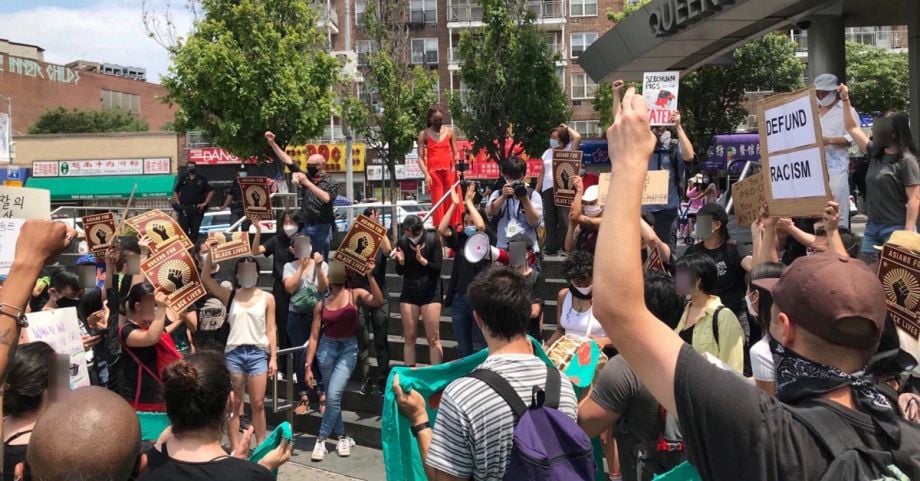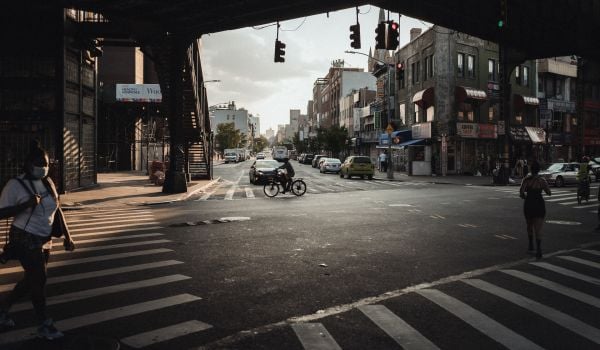Walking around the Flushing section of Queens, passing laundromats, bakeries, and nail salons, Kate Zen sees more than just other immigrant women of color running their own small businesses. She sees how sex work contributes to the vibrancy of New York’s storefronts and small businesses.
There are many reasons why people may become sex workers. Sex work is not sex trafficking, in which people are violently forced into the sex trade against their will. In sex work, the money is certainly a part of the decision, as sex work can be a crucial source of income and, in some cases, startup capital, for those denied access to other options.
“I’ve seen a lot of former massage parlor workers start bakeries, laundromats, or new massage parlors of their own,” says Zen, a former sex worker and co-founder and co-director of Red Canary Song, a collective of Chinese massage parlor workers in New York City that formed after massage parlor worker Yang Song died during a police raid on a Flushing massage parlor in November 2017.
“This is one of the few places where people of any education level could raise the capital to create businesses elsewhere,” says Zen.
It is the quintessential American story. Immigrants arrive, often fleeing persecution or other injustice elsewhere. They find a neighborhood that has at least some of the comforts of home — food, language, culture. Maybe some family or friends who came before them. They find work, even if it’s not necessarily the work they’d ever dreamed for themselves. They save up, and some of them start their own businesses, pay their way through college or get certification for careers they were already trained for when they arrived in the U.S.
But because of who they are and the kind of work they do, sex workers are seen as nuisances at best and easy targets at worst by those with more power and wealth in the city around them. They are largely immigrant women of color, some with legal residency status, some without.
Lately, because of the pandemic, Red Canary Song has focused its efforts on mutual aid to support a few dozen Chinese massage parlor workers so far. But just before the pandemic hit, the collective was starting to make strides in its work organizing Chinese massage parlor workers as part of broader efforts to challenge the deeper power structures of policing and real estate development that it believes to be behind why Yang Song fell to her death in 2017.
“The policing goes very much in hand with local powers and real estate to clear people out in ways that are very damaging,” says Zen. “It’s a form of violence that the real estate development isn’t done in a way that considers the people and community already there.”
Direct connections between policing and real estate development recently came into the national spotlight as a consequence of Louisville police officers killing Breonna Taylor in her own home.
As first reported by the Louisville Courier Journal, lawyers for Taylor’s family filed court documents alleging the city police department’s Place-Based Investigations squad as having “misled” narcotics officers to target a raid at Taylor’s former home, which resulted in her death by police shooting. The lawsuit alleges the police presence at her home had less to do with an actual drug ring and more to do with the city’s desired plans to acquire properties in the neighborhood as part of a city-led neighborhood revitalization plan.
A spokeswoman for Louisville Mayor Greg Fischer said the allegations are “outrageous” and “without foundation or supporting facts.” But the attention on the Louisville police department’s Place-Based Investigations squad has drawn additional scrutiny from city council.
Zen and her co-founders at Red Canary Song see similar connections in their neighborhood. One of the group’s first actions was a protest calling out the local council member, Peter Koo, for taking donations from the same real estate developers who were building new luxury condos and calling to “clean up the streets” of Flushing.
Not all massage parlor workers offer sex work, but Zen says police tend to profile massage parlor workers as sex workers. Sex work itself remains a crime in New York state.
But Zen points out a pattern in the ups and downs of actual enforcement of laws against sex workers and unlicensed massage parlors. As efforts to build more luxury housing in Flushing ramp up, so does policing.
From 2009-2020, Flushing added 3,075 new condominium units; second only to Brooklyn’s Williamsburg neighborhood, synonymous these days with rampant development of luxury housing. A city-led rezoning of the Flushing neighborhood in 2016 would have allowed for even more luxury housing development (along with a portion of permanently income-restricted housing under the city’s new mandatory inclusionary housing rules).
Meanwhile, although not all the arrests occurred in heavily-Asian immigrant Flushing, the total number of arrests of Asian-identified people charged with both unlicensed massage and prostitution increased by 2,700 percent between 2012 and 2016, according to a study by the nonpartisan Urban Institute. Non-citizen Asian migrant women made up 87 percent of the arrests for unlicensed massage.
The city eventually scrapped its rezoning plan after overwhelming local opposition. One of the concerns brought forth by Flushing residents and business owners was the displacement of many local businesses, which include massage parlors.
But the pressure to “clean up the streets” never ceased.
In 2019, the NYPD and landlords initiated a new wave of enforcement against massage parlors for operating without a license or offering illegal sex work.
Like clockwork, a group of private developers filed a new rezoning application in December 2019. The application is smaller than the previous city-led plan, focusing instead on converting a waterfront industrial area into large-scale luxury housing with a portion set aside for income-restricted housing.
Red Canary Song opposes the new rezoning. The sex worker collective sides with other organizations in the neighborhood who point out that more luxury housing units will encourage landlords to bring in higher-paying commercial tenants to serve new luxury residential tenants — and that the units designated as “affordable housing” under the proposed rezoning are still priced too highly to be affordable for most households in the surrounding neighborhood.
“We don’t want to just bargain for a few more deeply affordable housing units,” Zen says.
One solution to the problem of over-policing sex workers in gentrifying neighborhoods is to make New York the first state to decriminalize sex work. Red Canary Song is a member of the sex worker-led coalition pushing for the change, known as Decrim NY. After failing to pass the legislation last year, state legislators are trying again this year.
No U.S. state has fully decriminalized sex work, though across the country San Francisco sex worker advocates have at least gotten the city to create a layer of official mediation between the police and sex workers looking to report violent crimes.
The challenges go deeper. Zen agrees sex trafficking is a problem that needs a solution, but it is also a problem to her that the current system of enforcing sex trafficking laws depends on cooperation with police and the criminal justice system. Not all sex workers are a product of sex trafficking, but law enforcement has difficulty making the distinction.
Elected in 2019, Queens District Attorney Melinda Katz announced a plan to focus on prosecuting human traffickers and buyers of sex instead of sex workers, but advocates have said it simply puts sex workers into the position of conducting uncomfortable and even dangerous surveillance to report client identities to police. Still considered criminals themselves, sex workers have no right to demand true names and permanent contact info from clients. Asking clients for that information could result in losing the client, or eliciting a violent reaction.
Even if district attorneys see sex workers in a more dignified light, it’s still police who remain on the front lines, and there’s no guarantee they will treat sex workers with dignity. After Yang Song’s death, her family alleged that she had experienced sexual assault by police who were pressuring her to serve as an informant.
For sex workers who end up in the courthouse in Queens, the Queens Human Trafficking Bureau allows them to have charges cleared if they comply with court-mandated counseling through a taxpayer-funded counseling provider. But Zen says the counseling providers still don’t make a distinction between voluntary sex work and sex trafficking — their goal is to move people out of sex work, rather than dealing with challenges like labor issues that exist among sex workers as they do among other vulnerable workers.
“The organizations that are supposed to be helping sex workers include anti-trafficking organizations, and they have funding to provide services, but rather than addressing the stigma their services make people feel more stigmatized,” says Zen. “The initiative and entrepreneurship and hard work of people living in this industry is completely erased in the narrative of crime and trafficking.”
Red Canary Song is finding more receptive allies in anti-gentrification circles in New York and elsewhere. On March 6, at New York University, the collective helped organize a convening of Coast to Coast Chinatowns Against Displacement, a network of anti-gentrification organizers from Boston, New York, Seattle, Los Angeles, Vancouver, and Toronto. Zen recalls having a productive conversation about policing in gentrifying areas, that it was happening elsewhere to sex workers and other working class communities, especially immigrant communities.
It’s been especially useful to connect with Chinatown organizers from other cities, who often have to deal with some of the same particularities about organizing in Asian immigrant communities — often multi-generational communities, with previous generations maintaining language and customs that make it seem like they are more recent immigrants than they are. Families that have been here for three or four generations may be more aligned with prevailing political and real estate interests rather than the newer immigrants who are attracted to the same neighborhoods because of the familiar language, culture and food.
Many new immigrants seek out legacy immigrant neighborhoods because previous immigrants are more likely to hire them. Immigrant men from China have long found work in Chinatown restaurants, while the women found work in the garment industry — or massage parlors. The working conditions may not be ideal, but Zen would like to see them organized as workers instead of deputized as law enforcement.
“A lot of new immigrants get exploited by our own people who have been here longer,” says Zen.
This article is part of The Bottom Line, a series exploring scalable solutions for problems related to affordability, inclusive economic growth and access to capital. Click here to subscribe to our Bottom Line newsletter.

Oscar is Next City's senior economic justice correspondent. He previously served as Next City’s editor from 2018-2019, and was a Next City Equitable Cities Fellow from 2015-2016. Since 2011, Oscar has covered community development finance, community banking, impact investing, economic development, housing and more for media outlets such as Shelterforce, B Magazine, Impact Alpha and Fast Company.
Follow Oscar .(JavaScript must be enabled to view this email address)


















